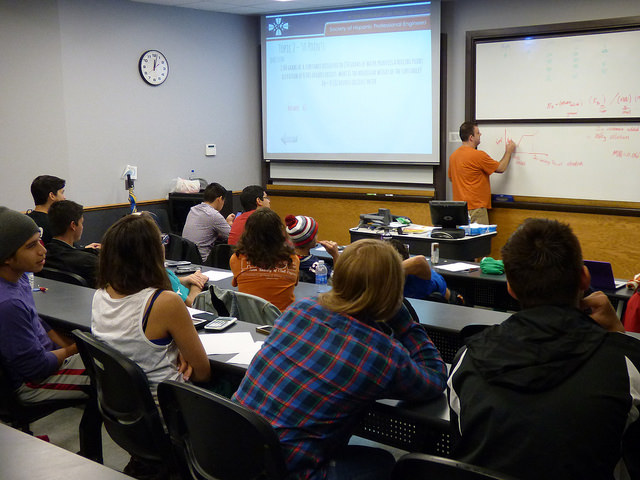By Luisa Florez

***
Undergraduate Anecdote (UA): “No hay mal que por bien no venga” is one of my mom’s frequent sayings. The equivalent of the idiom “every cloud has a silver lining” used to offer me no comfort when I failed at something, especially after working hard at it. It was difficult to realize that the amount of work put in did not necessarily equal the amount of success put out. This happened to me in my physics class where I learned that a large amount of hours studying did not guarantee that I would pass the class.
***
Many times, we decide to not explore opportunities for fear of failing. It is difficult to standardize what failure means, as each individual can perceive it differently. What may be a failure to someone may only be a small hiccup in the eyes of another. Regardless of what your definition of failure is, it’s important to acknowledge that when it happens, you have stumbled across a unique opportunity to undergo tremendous growth and learn. With the right mindset, you can capitalize on these experiences and find value in times when things don’t go exactly to plan. As Albert Einstein once said, “in the middle of difficulty lies opportunity.”
Five reasons why failing isn’t a catastrophe.
- It makes you resilient.
Being resilient is a great trait to develop and is useful in life, school and work. It’s probably why you’ll come across it in interview questions quite frequently (e.g. “Tell me about a time when you failed and how you overcame it”). If you’re exposed to a difficult situation, chances are you will be faced with the need of becoming resourceful and finding tools to tackle the situation. These experiences will become part of your repertoire that you can draw from to deal with similar circumstances down the road, allowing you to recover quickly from future situations.
- It brings motivation, innovation, and personal growth.
With the right mindset, you can embrace your feeling of disappointment and transform it into a source of motivation. The desire for continuous improvement can breed creativity and stimulate innovation as you seek new methods that will work and help you overcome. As engineers this is something we might experience frequently as we find ourselves with the need to modify our designs to successfully solve a problem. The determination to persevere can lead us to try something new and as consequence, allow us to grow from that new experience.
- It forces you to self-reflect.
Sometimes we get caught up in the motion of things. We get so involved in our routine that we forget to stop, smell the flowers and understand why we’re stopping to smell them in the first place. When we experience a moment that disrupts that motion, like a moment of misfortune, it can nudge us to stop and reflect on our strategies and on what’s going on. Embrace the “resets” life throws at you. Perhaps what you really want is to explore a new road, a new career. No matter how you do it, self-reflection is an important step to getting to know yourself and your goals better.
- It provides knowledge that brings a competitive advantage.
When things go wrong, you should always be able to learn something from it. Learning what doesn’t work is as valuable as learning what does. These experiences influence your perspective and can give you a unique lens to see the world through. If you can harness what you learned from these experiences and channel them into innovative solutions, effective strategies, etc., you can gain a significant advantage. As the Spanish saying goes, “el/la que sabe, vale por dos” (he/she who knows is worth two).
- It is part of life.
Life is full of ups and downs. Sometimes we can see the good or bad coming our way, and sometimes it just hits us. Everyone has struggled, even those who you may think are extremely successful (whatever your definition of success may be). Don’t be discouraged if you feel like things are not going to plan, everyone has been there. It’s okay to fail. The important thing is to accept that it happens, to learn from it and to not let it stop you from trying again.
***
UA continued: In order to pass my physics class, I had to pass the final. I had an alright average and had failed my fourth test. Failed it terribly. Though I was struggling, I realized I enjoyed the challenge of solving problems and became motivated to pass the class. I wanted to transfer into the school of engineering from undeclared so I knew I had to perform well. The day of the final I felt confident; I did everything everyone told me to do to be successful in the class. Once grades got in, my heart sunk. I failed the final. I fell asleep feeling very discouraged. The next morning, I woke up to an unusually beautiful May day. Yes, the beauty did not change the fact that I had failed, but it allowed me to put things in perspective. This type of challenge did not mean the end of the world and the end to my dream of becoming an engineer; it just meant that I would have to take the class again, readjust my strategy and apply to the engineering school the next semester. To my surprise, the following month I realized I passed the class. I had overlooked the silver lining that every engineering student looks forward to: the curve. In hindsight, this experience did not become a boulder to weigh me down as I continued towards my goal; instead, it became a source of knowledge that I could chip at to mold into tools to help me deal with the challenges that lay ahead.
***
Tune in next month for Failure: Part II.





2 Comments on “Failure: Part I. “No hay mal que por bien no venga”: 5 reasons why failing isn’t a catastrophe.”